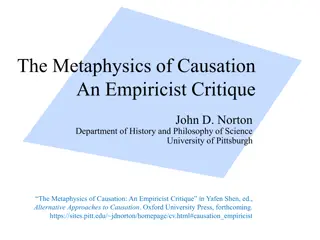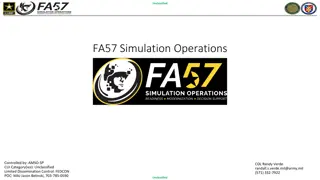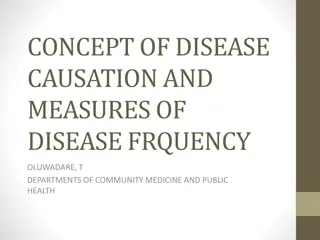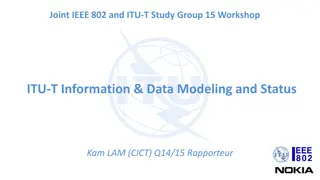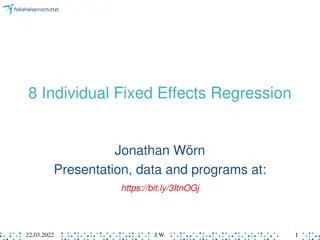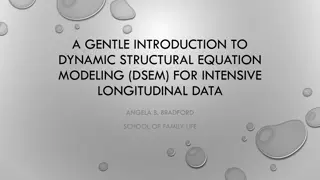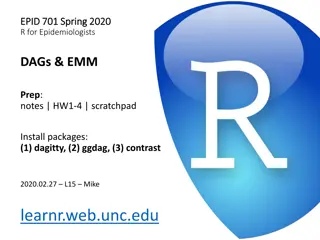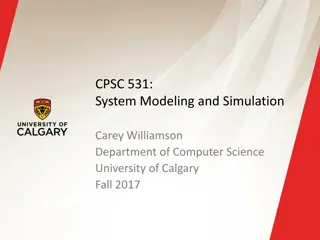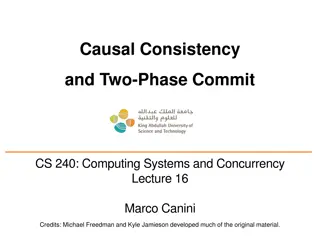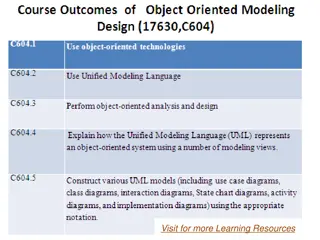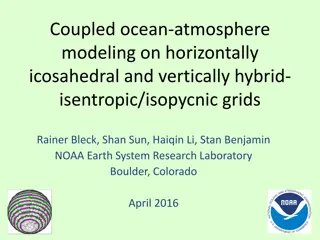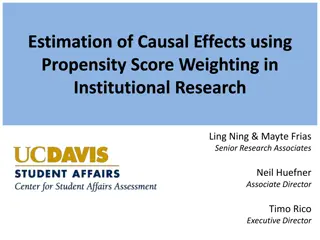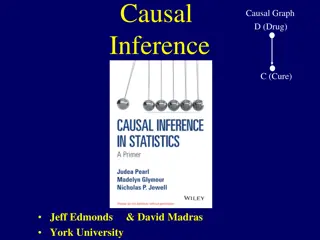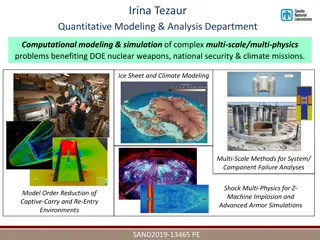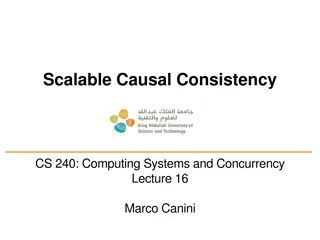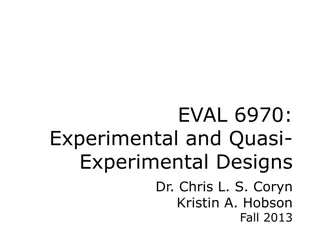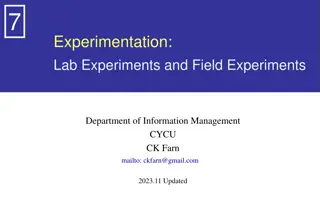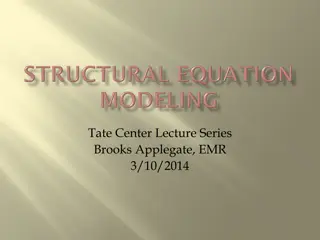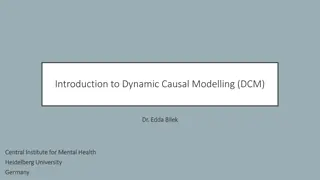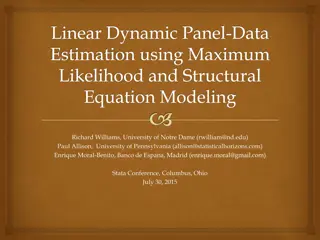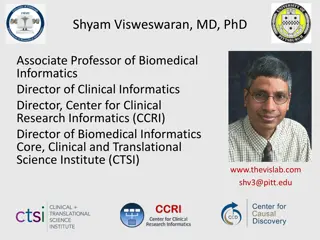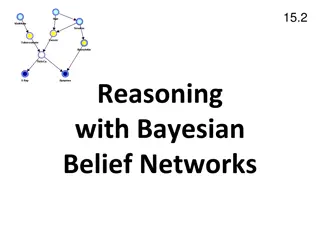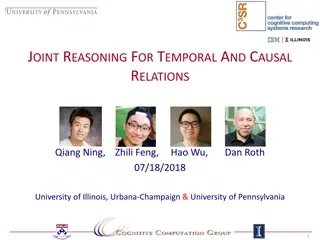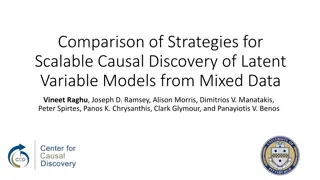Critique of Causal Metaphysics and Empiricism
In this content, the author critiques the metaphysics of causation from an empiricist perspective, exploring the limitations of empiricism in understanding the contingent truths of the world. It discusses causal antifundamentalism, various forms of skepticism, including Humean skepticism, and challe
4 views • 55 slides
Overview of Army Modeling and Simulation Office
The U.S. Army Modeling and Simulation Office (AMSO) serves as the lead activity in developing strategy and policy for the Army Modeling and Simulation Enterprise. It focuses on effective governance, resource management, coordination across various community areas, and training the Army Analysis, Mod
2 views • 8 slides
Disease Causation and Frequency Measures
The concept of disease causation delves into the factors that play a role in the development of diseases, emphasizing the importance of studying causation for prevention, control, and treatment. To infer causation, certain conditions must be met, and a causal relationship is characterized by associa
0 views • 47 slides
Evolution of Modeling Methodologies in Telecommunication Standards
Workshop on joint efforts between IEEE 802 and ITU-T Study Group 15 focused on information modeling, data modeling, and system control in the realm of transport systems and equipment. The mandate covers technology architecture, function management, and modeling methodologies like UML to YANG generat
2 views • 16 slides
Fixed Effects Regression for Causal Inference in Social Research
Explore the concept of fixed effects regression for obtaining causal estimates with observational data, focusing on the association between social participation and depressive symptoms. Discover how this method controls for time-invariant factors and eliminates confounding variables, providing a clo
1 views • 49 slides
Geometric Modeling in CAD
Geometric modeling in computer-aided design (CAD) is crucially done in three key ways: wireframe modeling, surface modeling, and solid modeling. Wireframe modeling represents objects by their edges, whereas surface modeling uses surfaces, vertices, and edges to construct components like a box. Each
2 views • 37 slides
Introduction to Dynamic Structural Equation Modeling for Intensive Longitudinal Data
Dynamic Structural Equation Modeling (DSEM) is a powerful analytical tool used to analyze intensive longitudinal data, combining multilevel modeling, time series modeling, structural equation modeling, and time-varying effects modeling. By modeling correlations and changes over time at both individu
3 views • 22 slides
Directed Acyclic Graphs (DAGs) for Causal Inference
Directed Acyclic Graphs (DAGs) play a crucial role in documenting causal assumptions and guiding variable selection in epidemiological models. They inform us about causal relationships between variables and help answer complex questions related to causality. DAGs must meet specific requirements like
1 views • 63 slides
System Modeling and Simulation Overview
This content provides insights into CPSC 531: System Modeling and Simulation course, covering topics such as performance evaluation, simulation modeling, and terminology in system modeling. It emphasizes the importance of developing simulation programs, advantages of simulation, and key concepts lik
1 views • 28 slides
Causal Consistency in Distributed Systems
This content covers the concept of causal consistency in computing systems, exploring consistency models such as Causal Linearizability and Eventual Sequential. It explains the importance of logical clocks like Lamport and vector clocks, and how they ensure order in distributed systems. The concept
0 views • 35 slides
Object Modeling in Software Development
Object modeling is a crucial concept in software development, capturing the static structure of a system by depicting objects, their relationships, attributes, and operations. This modeling method aids in demonstrating systems to stakeholders and promotes a deeper understanding of real-world entitie
1 views • 65 slides
Coupled Ocean-Atmosphere Modeling on Icosahedral Grids
Coupled ocean-atmosphere modeling on horizontally icosahedral and vertically hybrid-isentropic/isopycnic grids is a cutting-edge approach to modeling climate variability. The design goals aim to achieve a global domain with no grid mismatch at the ocean-atmosphere interface, with key indicators such
3 views • 21 slides
Estimation of Causal Effects using Propensity Score Weighting
Understanding causal effects through methods like propensity score weighting is crucial in institutional research. This approach helps in estimating the impact of various interventions, such as a writing program, by distinguishing causation from correlation. The use of propensity score matching aids
0 views • 22 slides
Causal Inference and Causal Graphs in Drug Efficacy Studies
This content delves into the concept of causal inference using causal graphs, specifically focusing on the relationship between a drug (D) and its effectiveness in curing a condition (C). It discusses the importance of distinguishing correlation from causation and explores scenarios where confoundin
0 views • 66 slides
Enhancements in Causal Forecasting: SPM 11.0.1/11.1 Overview
Key enhancements in SPM 11.0.1/11.1 focus on improving forecast accuracy through variable history slices, causal forecasting for multiple streams, multi-threading capabilities, easy access to product rollout and causal value pages, and more. The Next Gen Causal Forecasting introduces additional feat
0 views • 6 slides
Advancing Computational Modeling for National Security and Climate Missions
Irina Tezaur leads the Quantitative Modeling & Analysis Department, focusing on computational modeling and simulation of complex multi-scale, multi-physics problems. Her work benefits DOE nuclear weapons, national security, and climate missions. By employing innovative techniques like model order re
2 views • 6 slides
NetLogo - Programmable Modeling Environment for Simulating Natural and Social Phenomena
NetLogo is a powerful and versatile programmable modeling environment created by Uri Wilensky in 1999. It allows users to simulate natural and social phenomena by giving instructions to multiple agents operating independently, making it ideal for modeling complex systems evolving over time. NetLogo
0 views • 7 slides
Causal Consistency in Computing Systems
Explore the concept of Causal Consistency in Computing Systems, covering topics such as consistency hierarchy, Causal+ Consistency, relationships in causal consistency, practical examples, and its implementation within replication systems. Learn how it ensures partial ordering of operations and conv
0 views • 31 slides
Scalable Causal Consistency for Wide-Area Storage with COPS
This paper discusses the implementation of scalable causal consistency in wide-area storage systems using COPS. It delves into the key-value abstraction, wide-area storage capabilities, desired properties such as ALPS, scalability improvements, and the importance of consistency in operations. Variou
0 views • 42 slides
Experimental and Quasi-Experimental Designs
Explore the foundations of experimental and quasi-experimental designs, delving into causal relationships, counterfactual reasoning, and the importance of validating statistical and internal conclusions. Learn about causes, effects, and the complexity of determining causation in research. Discover R
1 views • 46 slides
Experimental Design and Validity Trade-offs in Research
Explore the concepts of experimental design, trade-offs in research validity, causal relationships, evidence, and controls in experiments. Delve into lab and field experiments, manipulation of variables, controls, and the importance of causal evidence in research. Consider the impact of extraneous f
0 views • 42 slides
Overview of DAGs in Causal Inference
Understanding Directed Acyclic Graphs (DAGs) in causal inference is crucial for guiding research questions and analyzing causal relationships. This overview covers the basics of DAGs, their requirements, and applications in analyzing causal assumptions. Dive into the world of DAGs to enhance your re
0 views • 28 slides
Latent Variable Modeling in Statistical Analysis
Latent Variable Modeling, including Factor Analysis and Path Analysis, plays a crucial role in statistical analysis to uncover hidden relationships and causal effects among observed variables. This method involves exploring covariances, partitioning variances, and estimating causal versus non-causal
0 views • 59 slides
Evolution of Universes in Causal Set Cosmology Analysis
Causal sets propose a discrete and dynamical spacetime structure, where spacetime elements, called spacetime atoms, evolve through stochastic dynamics. This growth process governs the passage of time, manifesting as accretion or birth of new elements. Classical Sequential Growth Models offer a frame
0 views • 17 slides
Causal Inference in Data Journalism
Delve into the world of data journalism as it explores the causal relationship between museum visits and longevity. Discover the theory of selection, randomized controlled trials, and the nuances of causal claims. Uncover the ambiguity in causal-associational relationships and the idealized RCT appr
0 views • 14 slides
Deriving Causal Inference from Nature
Uncover the nuances of causal relationships through experiments focusing on barnacles, substrate types, and potential outcomes. Explore the depth of mechanistic understanding and address confounding factors to refine your experimental design for robust causal inference.
1 views • 52 slides
Scalable Causal Consistency Using Dependency Matrices
This study explores Orbe, a system that achieves scalable causal consistency through dependency matrices and physical clocks. It discusses key-value data store APIs, partitioning strategies, data center structuring, geo-replication, consistency models, and the implementation of causal consistency in
0 views • 37 slides
Dynamic Causal Modelling
Peter Zeidman presents Dynamic Causal Modelling Advanced Topics at the Wellcome Trust Centre for Neuroimaging, University College London in October 2016. This course focuses on in-depth understanding and practical applications of dynamic causal modelling in functional magnetic resonance imaging (fMR
0 views • 34 slides
Understanding Causal Studies in Statistics
This detailed course overview covers topics such as design and analysis of causal studies, office hours, reading materials, assessment breakdown, course website information, and key concepts like causality and the Rubin Causal Model. It delves into the formal framework for causal effects, study desi
0 views • 24 slides
Introduction to Dynamic Causal Modelling in Neuroimaging
Explore the world of Dynamic Causal Modelling (DCM) in neuroimaging with Dr. Edda Bilek from Heidelberg University, Germany. Learn about modeling task-related fMRI data, estimating parameters, inferring model evidence, and specifying subject DCM in SPM. Understand structural, functional, and effecti
0 views • 25 slides
Understanding Causal Consistency in Distributed Systems
Explore the concept of causal consistency in distributed systems, focusing on the order of potentially causally related writes and the handling of concurrent operations. Learn about logical clocks, consistency models, distributed bulletin board applications, and more. Delve into quizzes on the valid
0 views • 39 slides
Dynamic Panel Data Estimation Methods for Causal Inferences
Learn about the challenges and methodologies of estimating dynamic panel data models using Maximum Likelihood and Structural Equation Modeling for making causal inferences. Discover the popular econometric methods like the Generalized Method of Moments (GMM) and insights on handling estimation probl
0 views • 30 slides
Biomedical Informatics Research by Shyam Visweswaran, MD, PhD
Shyam Visweswaran, MD, PhD, an Associate Professor of Biomedical Informatics, focuses on various aspects of the Learning Health System, Mobile Health Data, Molecular and Research Data, Data Mining, Causal Discovery, and the Reuse of EMR Data. His research includes improving EMRs, personalized modeli
0 views • 7 slides
Discrete Event Modeling vs. Agent-Based Modeling: A Comparative Analysis
Explore the differences between discrete event modeling and agent-based modeling in this informative presentation. Discover how these modeling approaches vary in defining system behavior, individual autonomy, and global outcomes, with real-world examples and accompanying research paper. Understand t
1 views • 8 slides
Bayesian Belief Networks: Understanding Causal Inference in AI
Dive into the world of Bayesian Belief Networks (BBNs) for reasoning with probabilities and causal relationships among variables. Developed by Judea Pearl in the 1980s, BBNs are essential for various AI applications such as diagnosis, expert systems, planning, and learning. Explore how BBNs encode c
0 views • 45 slides
Causal Inference in Big Data Research
Discover the importance of causal inference in performance debugging, health science, social sciences, and marketing. Explore the process of causal inference, its distinction from predictive analysis, and the goal of integrating it into relational databases for scalable analysis. Dive into specific
0 views • 14 slides
Understanding Joint Reasoning for Temporal and Causal Relations
Explore the importance of understanding temporal and causal relations in events, leveraging examples to illustrate how temporal and causal determinations are interconnected. Discover how time-sensitive information aids in establishing relationships between events, enhancing comprehension through joi
0 views • 22 slides
Understanding Causal Inference in Machine Learning
Explore the realm of causal reasoning and inference in machine learning, encompassing the discovery of causal relationships from data, heterogeneous treatment effects, automated causal inference, and more. Delve into the complexities of causal discovery and the effects of causes, shedding light on h
0 views • 22 slides
Causal Inference Research Areas and Projects Overview
Explore a comprehensive overview of research areas in causal inference, including unmeasured confounding, network analysis, psychometrics, transfer learning, and more. Delve into notable papers and projects, such as sensitivity analysis in genomic experiments and causal inference with latent variabl
0 views • 18 slides
Strategies for Scalable Causal Discovery of Latent Variable Models
Discover new strategies for causal inference on integrated datasets, comparing their benefits on simulated data and applying a high-performing strategy to real biomedical datasets. Explore Fast Causal Inference (FCI) algorithms for learning causal structures in the presence of confounding factors.
0 views • 40 slides
